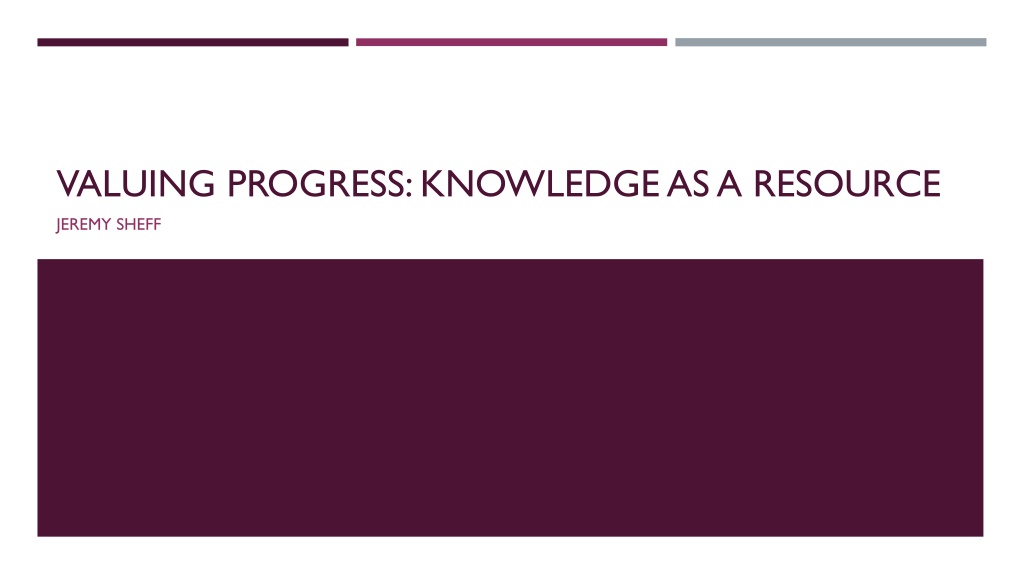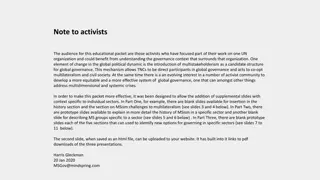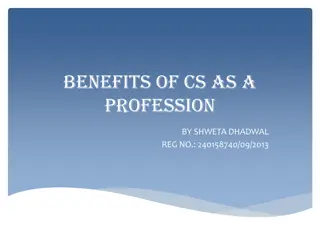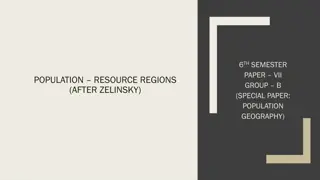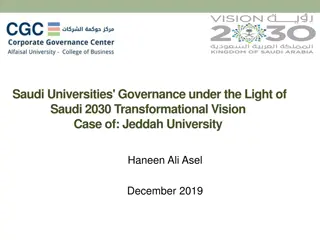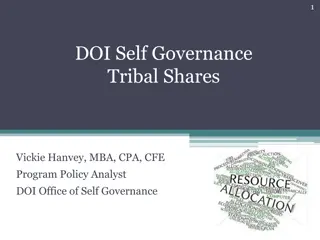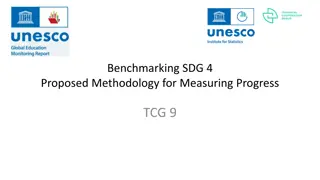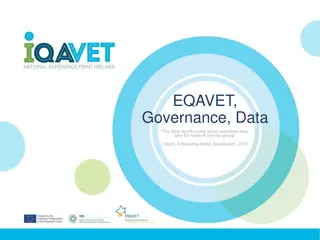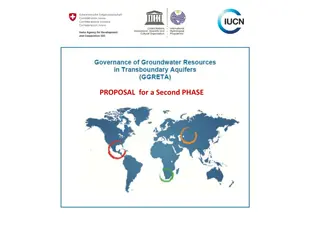Understanding Knowledge as a Valuable Resource in Progress and Governance
Explore the concept of knowledge as a resource for progress and governance through insightful perspectives from Jeremy Sheff, Isaiah Berlin, Arturo Espinoza, and Thomas Jefferson. Delve into the ideas of nonexcludability and nonrivalrousness in the context of public goods and resource allocation efficiency highlighted by Harold Demsetz. Gain a deeper understanding of the pluralist account of knowledge governance and the implications of sharing ideas in society.
Download Presentation

Please find below an Image/Link to download the presentation.
The content on the website is provided AS IS for your information and personal use only. It may not be sold, licensed, or shared on other websites without obtaining consent from the author. Download presentation by click this link. If you encounter any issues during the download, it is possible that the publisher has removed the file from their server.
E N D
Presentation Transcript
VALUING PROGRESS: KNOWLEDGE AS A RESOURCE JEREMY SHEFF
VALUING PROGRESS: A PLURALIST ACCOUNT OF KNOWLEDGE GOVERNANCE [H]uman goals are many, not all of them commensurable, and in perpetual rivalry with one another. - Isaiah Berlin Arturo Espinoza, CC-BY-2.0 https://flickr.com/photos/40683483@N07/8284855889
JEFFERSONS TAPER If nature has made any one thing less susceptible than all others of exclusive property, it is the action of the thinking power called an idea, which an individual may exclusively possess as long as he keeps it to himself; but the moment it is divulged, it forces itself into the possession of every one, and the receiver cannot dispossess himself of it. Its peculiar character, too, is that no one possesses the less, because every other possesses the whole of it. He who receives an idea from me, receives instruction himself without lessening mine; as he who lights his taper at mine, receives light without darkening me. - Thomas Jefferson Thomas Jefferson. Source: https://en.wikipedia.org/wiki/Thomas_Jefferson#/media/File:Official_Presidential_portrait_of_Thomas_ Jefferson_(by_Rembrandt_Peale,_1800)(cropped).jpg
JEFFERSONS TAPER Nonexcludability [T]he moment it is divulged, it forces itself into the possession of every one, and the receiver cannot dispossess himself of it. Nonrivalrousness [N]o one possesses the less, because every other possesses the whole of it. He who receives an idea from me, receives instruction himself without lessening mine; as he who lights his taper at mine, receives light without darkening me. - Thomas Jefferson Thomas Jefferson. Source: https://en.wikipedia.org/wiki/Thomas_Jefferson#/media/File:Official_Presidential_portrait_of_Thomas_ Jefferson_(by_Rembrandt_Peale,_1800)(cropped).jpg
PUBLIC GOODS Excludable Nonexcludable Rivalrous Private Goods Common Pool Resources Nonrivalrous Club Goods Public Goods
EXCLUDABILITY AND RESOURCE ALLOCATION Given the ability to exclude nonpurchasers, private producers can produce public goods efficiently. [And] the payment of different prices for the same [public] good is consistent with competitive equilibrium because extending the good to those who value it less does not prevent those who more from using it also. Harold Demsetz, The Private Production of Public Goods, 13 J.L. & ECON. 293 (1970). Harold Demsetz. Source: https://www.hetwebsite.net/het/profiles/demsetz.htm
NONRIVALROUSNESS AND NORMATIVITY If you could find a way of learning when people listen in to the radio, you might apply the exclusion principle to this area. Yet, you would be wrong in discouraging people from getting more satisfaction from listening in an extra hour when there is no true cost to society of their listening in that extra hour. Paul Samuelson Source: Samuelson Papers, correspondence, box 54, Musgrave, Richard, 1945 2007 Box 54. , quoted in Maxime Desmarais-Tremblay, Musgrave, Samuelson, and the Crystallization of the Standard Rationale for Public Goods, 49 HISTORYOF POLITICAL ECONOMY 59 (2017). Paul Samuelson. Source: https://www.nobelprize.org/prizes/economic- sciences/1970/samuelson/biographical/
CICEROS LUMEN [We should] bestow even upon a stranger what it costs us nothing to give. On this principle we have the following maxims: Let anyone who will take fire from our fire; Honest counsel give to one who is in doubt ; for such acts are useful to the recipient and cause the giver no loss. Marcus Tullius Cicero, De Officiis I.52 Marcus Tullius Cicero. Source: Jbribeiro1, https://commons.wikimedia.org/wiki/File:Bust_of_Cicero_(1st- cent._BC)_-_Palazzo_Nuovo_-_Musei_Capitolini_-_Rome_2016.jpg
DISTRIBUTIVE JUSTICE AND RESOURCES Normative evaluation of the allocation of benefits and burdens across members of society Access to resources is generally experienced as a benefit Deprivation of resources is generally experienced as a burden
NORMS OF DISTRIBUTIVE JUSTICE Political Equality: All else equal, all human beings have an equal claim to the benefits of social life, and an equal obligation to undertake its burdens. Responsibility: Any unequal benefits or burdens people experience should not be a function of brute luck, but of their own choices and actions. Source: Milo Winter, The Ants and the Grasshopper, in THE AESOPFOR CHILDREN 34 (1919).
MAINTAINING JUST DISTRIBUTIONS: RECIPROCITY Assume that benefits for some agents correlate with burdens for other agents: if I give you a loaf of bread, I lose a loaf of bread. Under this assumption, when agents return good for good and ill for ill, the baseline norm of political equality is maintained. The assumption generally holds for the benefits and burdens associated with scarce, tangible resources (i.e., private goods).
NORMATIVELY RELEVANT CHARACTERISTICS OF KNOWLEDGE Knowledge Production is Costly: it burdens the creator, but benefits nobody else. Knowledge Transfer is Costless: it benefits the recipient, but does not burden the giver. The burdens and benefits of knowledge creation and distribution are not correlated. Knowledge Creation Private Good Transfer Knowledge Transfer Burden on Creator/Giver? Benefit to Non-Creator/Recipient? Yes No Yes No Yes Yes
TWO MODES OF RECIPROCITY Compensation: The obligation to reciprocate is a function of the burden on the giver, such that we should measure it by the cost borne. Gratitude: The obligation to reciprocate is a function of the benefit to the recipient,such that we should measure it by the value received. The two modes coincide for scarce, tangible goods (particularly when mediated by markets). The two modes conflict for knowledge. If we adhere to one, we violate the other. Knowledge Creation Obligation Knowledge Transfer No obligation Private Good Transfer Obligation Compensation Gratitude No obligation Obligation Obligation
IMPLICATIONS FOR EVALUATION OF KNOWLEDGE GOVERNANCE If our norms of distributive justice are grounded in the characteristics of scarce, tangible resources, they will generate paradoxes when we apply them to knowledge. Conflating knowledge creation with knowledge distribution obfuscates but does not eliminate these paradoxes. Institutions that enforce norms of distributive justice in the context of scarce, tangible resources (such as markets) may violate those norms in the context of knowledge.
